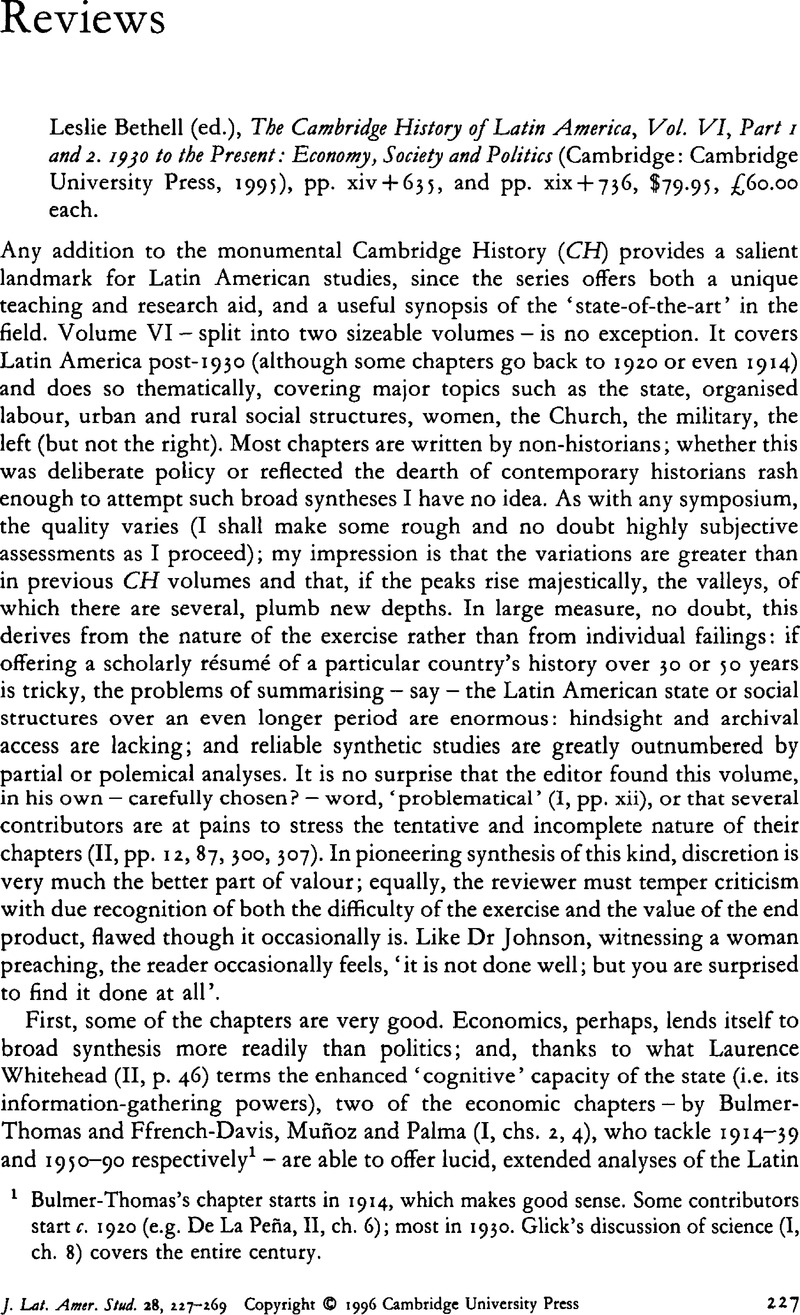No CrossRef data available.
Published online by Cambridge University Press: 05 February 2009

1 Bulmer-Thomas's chapter starts in 1914, which makes good sense. Some contributors start c. 1920 (e.g. De La Peña, II, ch. 6); most in 1930. Glick's discussion of science (I, ch. 8) covers the entire century.
2 Rock, David (ed.), Latin America in the 1940s: War and Postwar Transition (Berkeley, 1994)Google Scholar.
3 Such as Geoffrey Howe déclaring, shortly before the 1982 debt crisis, that ‘private markets have served us well in the continued success of the recycling process … it is the free market system that has recycled the surpluses and continued to deliver growth worldwide’: I, p. 238.
4 The bibliographies – running to 172 pp. – are extremely valuable and almost worth a review in themselves (some omissions come to mind). Most offer useful guidelines and will greatly assist the compilation of future reading lists – particularly in regard to themes such as the state, or women, which tend to be in demand. In some instances, the bibliographies are fuller than the chapter citations (e.g. I, ch. 5; II, ch. 5); and to take one example – Eyler Simpson, The Ejido, is recommended in the bibliography (II, p. 674) as ‘a rigorous analysis’ of ‘the agrarian strategies of Lázaro Cárdenas’, even though it was written before Cárdenas took power. It is, perhaps, worth noting that, in the (full but fulsome) bibliography relating to Rouquié's chapter on the military, two works by the aforementioned Rouquié are termed, respectively, ‘fascinating’ and ‘one of the finest books ever published on Latin American military politics’ (II, pp. 636–7). It is a relief to learn that Rouquié did not compile the bibliography.
5 Of course, the Chiapas rebellion came long after these chapters were written. I mention this (a) because, as several studies show, rural mobilisation was afoot in Chiapas long before January 1994; and (b) because generalisations about guerrilla warfare and leftist challenges to the status quo now have to take Chiapas into account. There is no hint of such possibilities in these volumes – a reassuring reminder, perhaps, of how history regularly upstages historiography.
6 Volume X of the Cambridge History deals with ‘culture and society’, but I have no idea if it will plug these gaps.
7 Dussel could fairly respond that his chapter starts in 1930 and that a 1926–9 rebellion lies beyond his remit. However, he does deal with high Catholic politics in the 1920s (II, p. 559); he alludes, briefly and superficially, to the Cristiada; and he does not pursue the convoluted story of Church-State conflict which dominated much of Mexican politics in the 1930s – and still showed signs of life in the 1950s and 1960s.
8 Since Love's chapter was, apparently, submitted about a decade ago, he cannot be blamed for neglecting neoliberalism; but his emphasis throughout the chapter is on the genesis of ideas (particular original ideas), rather than the gestation of policy.
9 Glick does not feel the need to justify the inclusion of psycho-analysis under this heading – which is not to say that the topic should be ignored; rather that it might be better located elsewhere.
10 I assume this is a misprint for 1941.